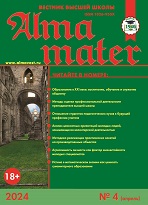UDC 14
https://doi.org/10.20339/AM.08-20.085
Zh.V. Latysheva is Dr.Sci. (Philosophy), doc., head of sub-faculty at Vladimir State University n.a. A.G. and N.G. Stoletovs e-mail: joan_lat@mail.ru
Presented is definition of specificity and sphere of applicability of the concept of social transcending in social sciences, studying of which carries out in the conceptual field of the theory of autopoiesis. The current state of development of the autopoietic theory in native and foreign literature is analyzed, such as problem of the lack of formation of a stable practice of studying autopoiesis of person in its entirety, concentration of researchers on individual autopoietic processes of person, culture and society as counterbalance to their integrative understanding is revealed, which leads to one-sidedness and dichotomy of results of such contemplation. To overcome this problem, the author comes up out with proposal to comprehend the human autopoiesis of the whole human being, i.e. in the entirety of his physical, spiritual, social and creative manifestations by demonstrating, that social transcending is its core. Two modern points of view, which explicate autopoiesis of human beings, are highlighted and critically analyzed, i.e. embodied cognitive science, disclosed by E.N. Knyazeva, and anthropological poetics by S.A. Smirnova. Both researchers show, that specific peculiarity of human autopoiesis is social transcending. However, in Knyazeva’s approach, self-creation is embodied through transcending as social “self-building” of person, whereas, according to Smirnov’s anthropopoetics, transcending of self-creation is aimed at transforming personality and society, presenting in entirety its existential and social anthropological practices. Conclusion is made, that despite differences in understanding of autopoiesis considered approaches are stages of successive deepening in understanding of person’s self-creation and reveal one of its basic mechanisms, i.e. social transcending, directing to higher meanings (senses) and values of social and personal infinite being, leading to transformation of these types of being.
Key words: social philosophy, education, social transcending, autopoiesis, systematic approach, holistic approach, personal being, social being, self-building, transformation.
References
- Appolonova, Yu.S. Specific of transcending as meta-phisic aspect of being of person. Vestnik of Vyatka state university. 2018. No. 2. P. 23–29.
- Berger, P., Luhmann, T. Social constructing of reality. Moscow, 1995.
- Bobkov, A.I., Karmadonov, O.A. Religious experience as fundamental beginning of ethnic subjectivity. Socio-dynamic. 2017. No. 3. P. 101–107.
- Glagolev, V.S. Scientism and philosophical truth in the epoch of globalization. In: Search of truth in space of modern culture. St. Petersburg, 2016. P. 93–100.
- Erofeeva, M.A. “Meaning” as element of sociological theory. Vestnik of Sankt-Petersburg university. 2014. No. 1. P. 135–142.
- Ivakhnenko, E.N., Attaeva, L.I. Autopoiesis “epistemic things” as new horizon of constructing of social theory. Problems of social theory. 2013–2014. Iss. 1–2. P. 96–106.
- Kapra, F. Hidden connections. Sofia, 2004.
- Karpov, A.O. On the problem of phenomenology of creativity. Philosophical sciences. 2005. No. 5. P. 105–119.
- Karpov, A.O. On the problem of phenomenology of creativity. Philosophical sciences. 2005. No. 6. P. 127–135.
- Knyazeva, E.N. En-activizm: new form of of consructivizm in epistemology. Moscow, 2014.
- Kostromina, S.N., Demeanchuk, R.V. Conception of professionally personal development of pedagogues: anthropology approach. Problems of modern pedagogical education. 2016. No. 51-7. P. 342–353.
- Maturana, U., Varela, F. Tree of cognition. Biological roots of human understanding. Moscow, 2001.
- Matushanskaya, Yu.G. Autopoiesis of Bible philosophical historical conception as world view fundament of Western civilization. Arkhangelsk, 2015.
- Milovidov, V.A. Meta-linguistic of every day. In: Humanitarian aspects of every day: problems and prospects in 21st century. Voronezh, 2019. P. 20–27.
- Morozova, I.N. Labor, creativity, serving as existence of the truth in culture. In: Search of truth in space of modern culture. St. Petersburg, 2017. P. 97–104.
- Morozova, I.N. The principle of transcendency: contexts of philosophy of culture. Contemporary problems of humanitarian and social sciences. 2016. No. 3. P. 78–88.
- Morozova, I.N. Being of human in culture: transcendency and immanentcy. In: Being of human: the problem of unity in many images of modern world. Chelyabinsk, 2016. P. 65–71.
- Simonenko, T.I. Russian philosophy on unity of human as the problem of education. Vestnik MGTU. 2016. No. 2. P. 378–382.
- Smirnov, S.A. Autopoesis of human. Philosophical scetches on anthropology of verses. Novosibirsk, 2011.
- Smirnov, S.A. Human’s foresight: Experience in non-classic philosophy of human. Novosibirsk, 2015.
- Tsokolov, S. Discourse of radical contructivizm: Traditions of scepsis in modern philosophy and the theory of cognition. Munich, 2000.
- Allen, M., Friston, K.J. From cognitivism to autopoiesis: towards a computational framework for the embodied mind. Synthese. 2018. No. 6. P. 2459–2482.
- Bickhard, M.H. Inter- and En- activism: Some Thoughts and Comparisons. New Ideas in Psychology. 2016. Vol. 41. P. 23–32.
- Da Costa, V.F. Comments on the possibility of autopoiesis of the musical work and on the performer as it’s systemic component. Debates. 2018. Vol. 21. P. 155–178.
- Durand, F. Evolution, Reproduction and Autopoiesis. HTS Teologiese Studies. URL: https://www.researchgate.net/publication/321136096_Evolution_reproduction_and_autopoiesis
- Gerim, G. A Critical Review of Luhmann’s Social Systems Theory’s Perspective on Mass Media and Social Media. Journal of humanity & society. 2017. Vol. 7. Iss. 2. P. 141–154.
- Knyazeva, H. Paradigm shift in the understanding of the creative abilities of consciousness. Filosofiya a-philosophy. 2018. No. 1. P. 14–22.
- Maiese, M. Embodiment, Socity, and the Life Shaping Thesis. Phenomenology and the Cognitive Sciences. 2019. Vol. 18. Iss. 2. P. 353–374.
- Smirnov, S.A. Anthropological Practices of Self-Care: Eventfulness of the Concept. Journal of Siberian Federal University. 2018. No. 2. P. 306–324.
- Varela, F.J. The Early Days of Autopoiesis. Sistems Research. 1996. No. 13 (3). P. 407–416.
- Voros, S., Bitbol, M. Enacting Enaction: A Dialectic Between Knowing and Being. Constructivist Foundations. 2017. No. 1. P. 31–40.











.png)






